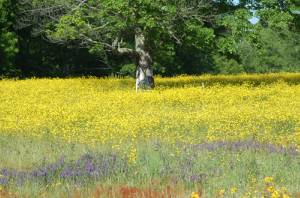Plants form a plantscape — more or less continuous — across a continent: the carefully tended jardin and the yard of “weeds” surrounding an abandoned house.  Fallen dead trees in a forest, or overgrown city lots might seem like problems in need of solving… Elite classical musicians have often held themselves apart from other musicians, or even other classical players: “I’m better that that.” “His playing was so stupid,” or “uninvolved,” or “ugly,” or “dishonest,” or “That music is so shallow,” or “repetitive,” or “derivative.” But the total musicscape is ours all the time. And if we make music, then we contribute to it directly, change it a little, “recenter” it a little every time we touch the strings. All the piano playing in the world right now, for example — that’s our “pianoscape” (“piano-playing-scape”). And we pianists are responsible for it.
Fallen dead trees in a forest, or overgrown city lots might seem like problems in need of solving… Elite classical musicians have often held themselves apart from other musicians, or even other classical players: “I’m better that that.” “His playing was so stupid,” or “uninvolved,” or “ugly,” or “dishonest,” or “That music is so shallow,” or “repetitive,” or “derivative.” But the total musicscape is ours all the time. And if we make music, then we contribute to it directly, change it a little, “recenter” it a little every time we touch the strings. All the piano playing in the world right now, for example — that’s our “pianoscape” (“piano-playing-scape”). And we pianists are responsible for it.
In Asia, people ask me if I’m recruiting students for my school in the U.S. How to answer? The standard is so high for admission to New England Conservatory now–or Juilliard or Curtis, I group these three together as having the highest standard of student piano playing in the U.S., apologies to my colleagues elsewhere — very few young musicians I encounter anywhere are really prospective students for the school. It doesn’t mean I’m not interested in what’s going on.
We are often so single-minded! What was the “authentic” way of playing a mordent in Saxony in the mid-eighteenth century?  Surely, as there were many players, there were many ways. Some probably pleased the cognoscenti more. In classical music, we are in the habit of making stark value judgments, but this judging dulls us. Consider the statement I made above about standards of piano playing in American conservatories! And we may think we have the greatest impact by teaching only the most “exceptional” students, but it’s not so clearly true. Those students so identified are likely the musicians who most closely match our sense of appropriate technical means and musical sensibilities…
Surely, as there were many players, there were many ways. Some probably pleased the cognoscenti more. In classical music, we are in the habit of making stark value judgments, but this judging dulls us. Consider the statement I made above about standards of piano playing in American conservatories! And we may think we have the greatest impact by teaching only the most “exceptional” students, but it’s not so clearly true. Those students so identified are likely the musicians who most closely match our sense of appropriate technical means and musical sensibilities…
What about our “meadow” in Hopkinton? Now, I know that if you never mow, eventually most land in the Northeastern U.S. will produce scrubby trees, followed by forest. (Our woods was pasture a hundred years ago.) If you mow weekly in the warm months, you will have mostly grasses. If you mow once or twice a year, flowers will appear and multiply. And, maybe, if we manage music too closely we will only get…
I have often thought that if I had grown up in a big city, surrounded by lots of high-level aspiring pianists, and perhaps in contact with an elite teacher — I could easily have stopped playing. I developed in a much more unregimented way. I did have good teachers, but there were not scores of fancy young virtuosos in Iowa. I had a lot of opportunities to play, and to dream — to dream up a life and an identity that could easily have been mowed down.
As there’s a broad pianoscape, there’s an “agescape” too. Let’s be reluctant to dismiss what those much younger than us do or believe — or those older. My physicist roommate once informed me that I was about a hundred years old: “Well, you’re not zero years old, so you’re about a hundred,” he said. All of us on this planet at this moment form an identity and it’s ours — all of ours. And all of our actions and beliefs belong to all of us. There’s constant shifting, of course, as people enter, and exit, and act. We can affect the totality, perhaps beneficially, in each moment. We can do that for piano playing too.

Hi! I’m sure you must have received hundreds of comments, and perhaps mine will seem small, but — it is sent with much appreciation for the comments you have made. As a piano teacher of beginning students, I try hard to teach the correct basics, inspire my students to play with “heart”, and encourage them to make piano playing their own means of expression. They may never become “great” but they will add to the harmony of the atmosphere they share with others, and perhaps bring a little joy to those around them. What more is music supposed to do?
If we are too critical and too unyielding to accept someone’s ideas of expression, we are limiting the good we can share and experience.
Thank you so much for your comments.
Mary Alyce